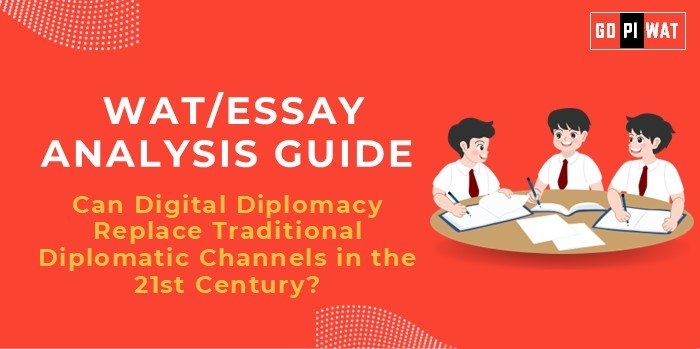📋 Written Ability Test (WAT) Analysis Guide
🌍 Topic: Can Digital Diplomacy Replace Traditional Diplomatic Channels in the 21st Century?
📖 Understanding the Topic’s Importance
💡 Digital diplomacy represents a paradigm shift in international relations, offering faster, cost-effective solutions. For B-schools, this topic bridges technology management with global strategic thinking.
🕒 Effective Planning and Writing
- ⏱️ Time Allocation:
- Planning: 5 minutes
- Writing: 20 minutes
- Review: 5 minutes
✍️ Introduction Techniques
- ⚖️ Contrast Approach:
“While traditional diplomacy relies on closed-door negotiations, digital platforms like Twitter and Zoom have redefined international interactions, raising questions about their viability as replacements.”
- 💡 Solution-Oriented Approach:
“To bridge diplomatic gaps, integrating traditional and digital methods offers a pathway to inclusivity and efficiency.”
📚 Structuring the Essay Body
- 🏆 Achievements:
- WHO’s use of digital platforms for crisis management during the COVID-19 pandemic.
- Increased citizen engagement through platforms like Twitter for public diplomacy.
- ⚠️ Challenges:
- Cybersecurity threats and risks of sensitive data breaches.
- Digital divide limiting participation from underprivileged regions.
- Spread of misinformation compromising diplomatic objectives.
- 🌏 Future Outlook:
- Propose hybrid models combining traditional and digital methods for comprehensive diplomacy.
- Emphasize the need for secure and transparent platforms to enhance trust.
- Advocate for AI integration to streamline diplomatic processes.
🔑 Concluding Effectively
- ⚖️ Balanced Conclusion:
“Digital diplomacy is a powerful tool but not a standalone replacement for traditional channels.”
- 🌍 Global Example Conclusion:
“Estonia’s digital diplomacy offers a roadmap for nations to adopt inclusive, secure, and transparent models.”
📊 Analyzing Successes and Shortcomings
- 🏆 Achievements:
- Significant cost savings and broader global reach through digital platforms.
- Improved engagement between governments and citizens.
- ⚠️ Challenges:
- Inequality in digital access across developing nations.
- Challenges in addressing the loss of personal nuances in digital interactions.
🌱 Recommendations for Sustainable Progress
- 📜 Invest in robust cybersecurity frameworks to safeguard sensitive communications.
- 📈 Enhance digital access in underprivileged regions to ensure inclusivity in diplomacy.
- 🤝 Promote public-private partnerships for technological innovation in diplomacy tools.
📄 Sample Short Essays
- ⚖️ Balanced Perspective:
“Digital diplomacy complements but cannot replace traditional methods. While efficient, it lacks the personal nuance crucial for conflict resolution.”
- 💡 Solution-Oriented:
“Integrating AI and secure platforms into traditional diplomacy ensures faster and inclusive global communication.”
- 🌍 Global Comparison:
“Estonia’s e-diplomacy model demonstrates that digital tools enhance but do not negate the need for in-person negotiations.”


